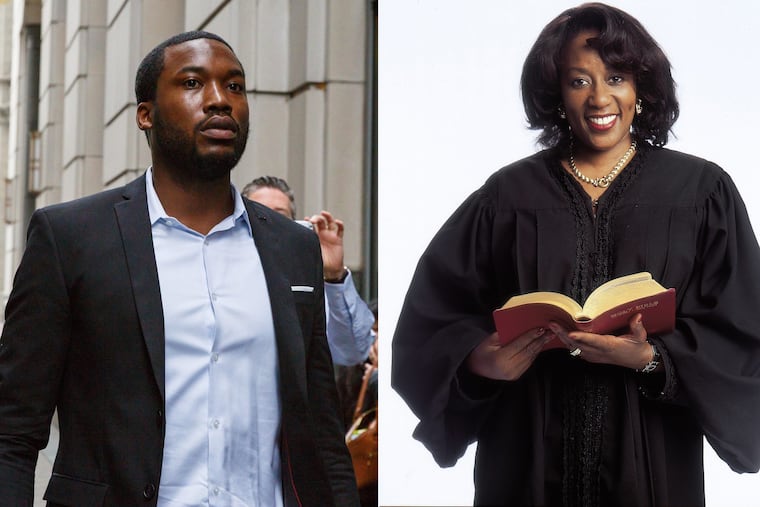Judge Genece Brinkley denies Meek Mill effort to overturn conviction
Common Pleas Court Judge Genece Brinkley wrote in a 47-page opinion filed late Monday that Mill did not meet his burden of proof in seeking to cast doubt on the evidence used to secure his arrest in 2007 and subsequent conviction.

In the latest volley in a long-running court battle, a Philadelphia judge has denied the rapper Meek Mill's most recent attempt to have his decade-old conviction overturned.
Common Pleas Court Judge Genece Brinkley wrote in a 47-page opinion filed late Monday that Mill did not meet his burden of proof in seeking to cast doubt on the evidence used to secure his arrest in 2007 on gun and drug charges and subsequent conviction.
The decision is all but certain to keep alive the high-profile feud between the rapper and the judge.
In an interview, Joe Tacopina, one of Mill's attorneys, said Brinkley was acting like an "immature, petulant, ignorant child," and added: "I didn't think I could question her ability to be qualified to sit as a judge anymore … but I have now reached a new high."
Brinkley has consistently defended her handling of the case, and pushed back against accusations made by Mill's attorneys that she has acted inappropriately or unethically and should recuse herself. Brinkley has been on the receiving end of withering attacks since November, when she ordered Mill to serve two to four years in prison for violating the terms of his probation.
Brinkley is barred from responding directly to Tacopina's latest remarks due to judicial conduct rules. Her attorney, A. Charles Peruto Jr., said in a brief interview Tuesday: "If Joe Tacopina had any dignity, we would dignify that with a response."
In her latest opinion, Brinkley took aim at what she called a "lack of investigation" by the District Attorney's Office into allegations that Mill's arresting officer, Reginald Graham, had credibility problems. She also questioned whether a longstanding process by which the prosecutor's office and the Defender Association review potentially tainted cases was sufficiently thorough, and, in an unusual footnote, said that continuing to rely on a flawed system was akin to legitimizing slavery.
"The institution of slavery persisted in this country for over 300 years," she wrote. "The continuation of these practices depended on the complicity of those who had the power to change it and believed that the practice was beyond reproach due to the longevity."
Bradley Bridge, a public defender who for decades has led efforts to review problematic cases, said Tuesday that he agrees with Brinkley on the need to continually evaluate processes for improvement, a position he expressed to her in court earlier this month. But he added: "I am troubled by the scant attention Judge Brinkley pays to a procedure that has been supported through five district attorneys and at least two judges over the past 23 years."
Brinkley also wrote that one of the officers accusing Graham of corruption, Jeffrey Walker — whom she calls the linchpin of Mill's claims for relief — had credibility issues of his own, including a federal conviction for theft crimes related to his work as a police officer.
The judge said she was more inclined to believe Graham's testimony than Walker's, and said that Walker's accusations of corruption against Graham — which helped land Graham on a list of officers whom prosecutors labeled as not credible — were irrelevant to Mill's prosecution.
"Ultimately, the allegations of misconduct related to Officer Graham do not relate to the facts of [Mill's] case … and do not create a question of credibility for [Mill's] underlying trial and arrest," she wrote.
Her apparent support for Graham came weeks after he spoke publicly about the case for the first time, defending his police career in an interview published this month by Philadelphia Magazine.
Still, Tacopina, Mill's lawyer, said Brinkley was relying on Graham "in order to be right in this case, in order to make herself look like she wasn't wrong all along."
Ben Waxman, spokesperson for the District Attorney's Office, declined to comment on Brinkley's opinion and her criticisms of the office's investigation into Graham. The office said in April that it supported Mill's bid for a new trial.
Tacopina said Mill's legal team hopes for relief from a higher court. Mill, meanwhile, remains free on bail pending resolution of his appeal.